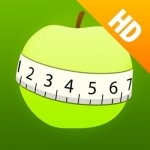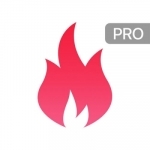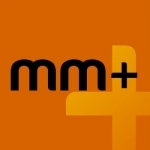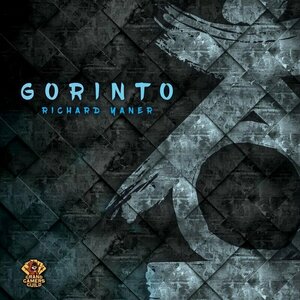
Food Diary and Calorie Tracker by MyNetDiary HD
Health & Fitness and Lifestyle
App
MyNetDiary is the easiest to use and most comprehensive food diary and calorie counter app on the...

Weight Loss RUNNING PRO
Health & Fitness and Lifestyle
App
SLIM DOWN IN 8 WEEKS. The first running app on the App Store designed specially for weight loss....

My Macros+ Diet, Weight and Calorie Tracker
Health & Fitness and Lifestyle
App
My Macros+ is the only diet tracking app made by a fitness professional! We are proud to bring you...

Weight Loss RUNNING
Health & Fitness and Lifestyle
App
SLIM DOWN IN 8 WEEKS. The first running app on the App Store designed specially for weight loss....
Purple Phoenix Games (2266 KP) rated Gorinto in Tabletop Games
Mar 2, 2020
A “gorinto” is a Japanese five-tier pagoda tower where each tier is representative of something of religious importance. In this game, each tier is representative of one of the elements: fire, water, wind, earth, and void. In this prototype version, the season tracking pawn is a representative gorinto. To gain deeper understanding of these elements and attain ultimate Wisdom is the goal of the game of Gorinto.
DISCLAIMER: We were provided a prototype copy of this game for the purposes of this review. These are preview copy components, and the final components will be different from these shown. Also, it is not my intention to detail every rule in the game. You are invited to download the rulebook, back the game through the Kickstarter campaign running until March 4, 2020, or purchase through any retailers stocking it after fulfillment. -T
To setup, each player will choose a color, take the play mat of matching color, and place their score marker on the score board. The season tracker will be placed on the scoreboard as well, along with the randomized Goal cards and end-of-game element scoring cards. The main play board will be populated with randomized element tiles pulled from the bag in the shape of a mountain, with 10 tiles placed along the side and top edges of the built mountain of tiles. Determine the first player and the game is ready to be played.
On a player’s turn they will choose one of these outlying tiles to move onto the board. Once placed, the player will choose tiles, based on the placed tile’s power, from the board. For example, “fire spreads tall,” so if a Fire tile is placed on the board, a player may choose any tile from the column where it was placed two spaces above or below the placed tile. The number of tiles that can be plucked from the board depends on the player’s “understanding” of the element (the number of tiles of that type on the player’s board +1). With two tiles on a player’s personal board, they can choose three tiles when moving that type of tile, in the example – fire.
Tiles moved from the left side of the mountain can only move horizontally in their row and tiles moved from the top of the mountain can only move vertically in their column. With each of the elements possessing different ways tiles can be chosen from the mountain, and understanding of each element affecting how many tiles can be chosen, players need to plan ahead for their turns… except that other players will be doing the same and planning their own strategies to destroy their opponents’ plans.
When there are fewer tiles to be moved outside the mountain than there are players, the season (round) ends. At this point, players will score the Goal cards before setting up for the next season.
Each season the Goal cards will be scored – so players will know throughout the game upon what they should be concentrating their efforts. Examples of these Goal cards are: score your tallest stack (1 point per tile), then score your shortest stack (0 points if no tiles on a stack); score your stacks with odd number of tiles twice; score the stack with the median number of tiles three times. By being able to manipulate and keep track of the tile stacks players can be planning their scores ahead of time for each season.
Components. Again, this is a prototype copy of the game, but already one can see the direction this game is headed, and it’s glorious! I have seen the Kickstarter page, and am super excited about seeing nearly every component get a fantastic upgrade. The art direction is incredible, the physical components are plastic and cardboard heaven. I am even pretty happy with this prototype copy. Yeah, the tiles are squarish wooden tiles with stickers, and the retail copy will have sexy interlocking plastic tokens, and the player boards in prototype are rectangular, but the retail copy will have a fancy contoured edge. Even so! The game looks amazing on the table, and will be even more so once it goes to manufacturing in earnest.
I mentioned in my intro that I am falling more in love with abstracts the more I play them. Has it just been that abstracts have been getting better and better lately, or am I leveling up as a gamer? I don’t know and I don’t care. Abstracts hold a very special place in my heart now, and this one is one of the best I have played. Most abstracts get a bad rap for being themeless and boring to look at, but Gorinto brings it and I’m totally diggin’ it. I love games like Gekitai, Calico, Elementos, Hive, and Onitama, and now there’s another to add to my display case of amazing abstracts.
If you enjoy themed abstract strategy games, games that make you think without bogging you down, and games that make you smile even when you lose simply because you enjoyed the experience, you should check this one out. There is still time to back it through Kickstarter, but the campaign ends on Wednesday, March 6. At the time of writing, the campaign is funded at over 500%.
